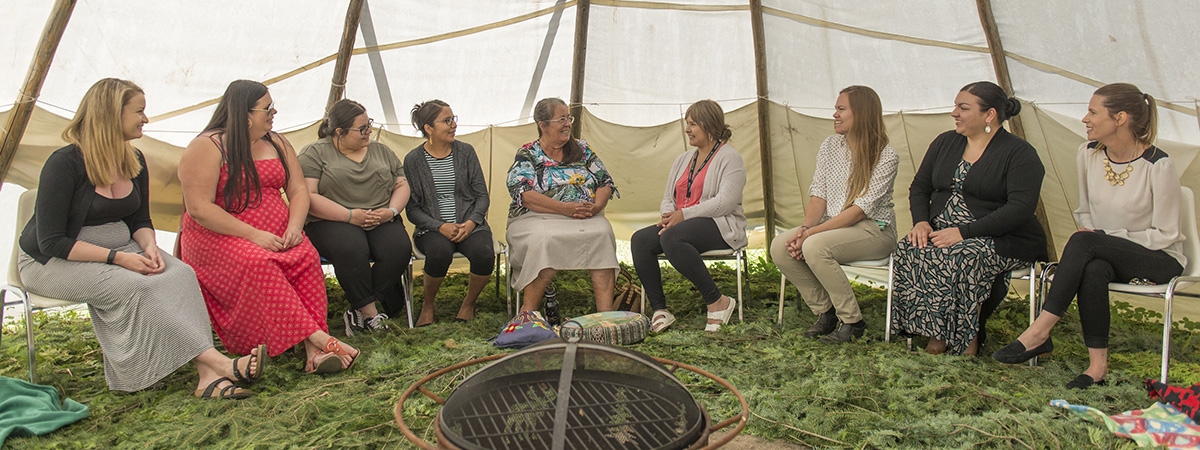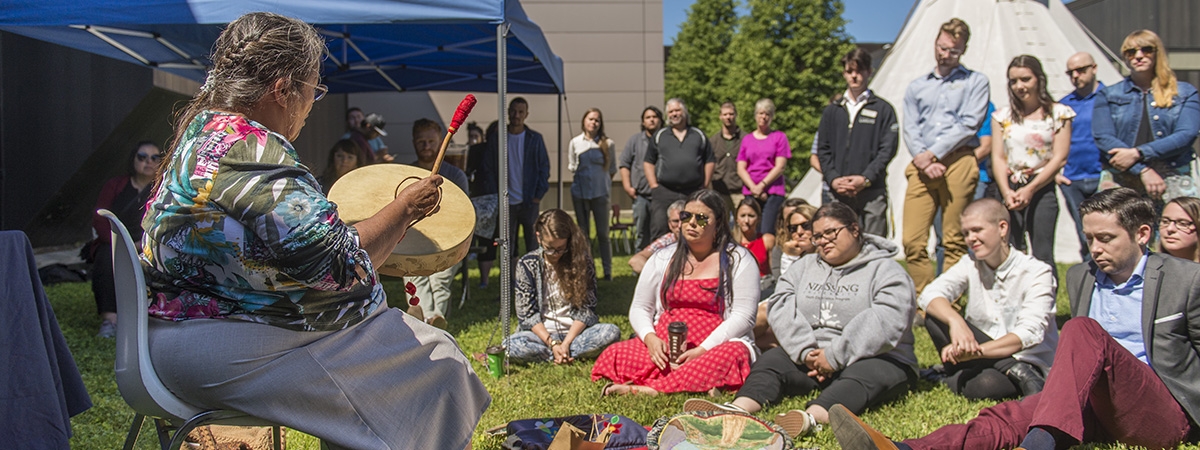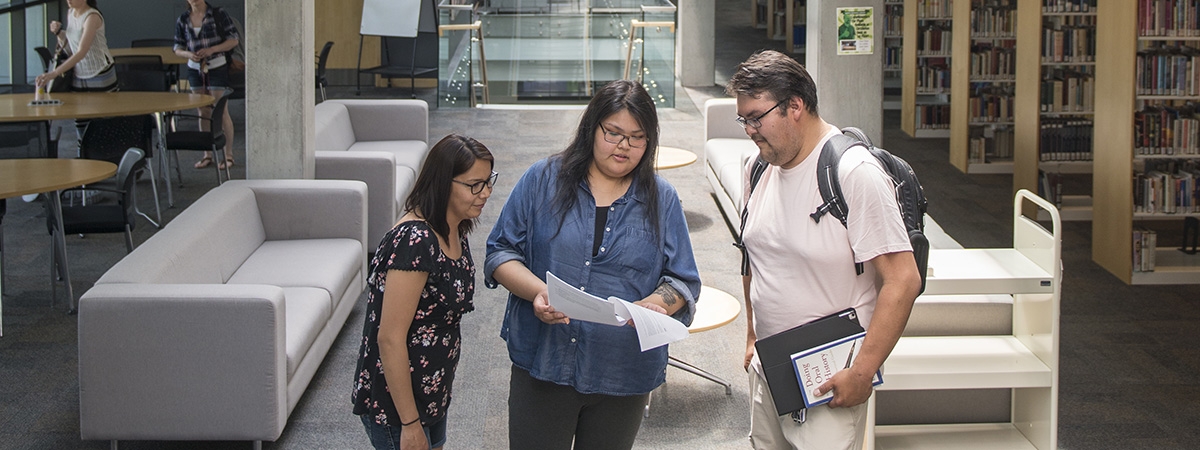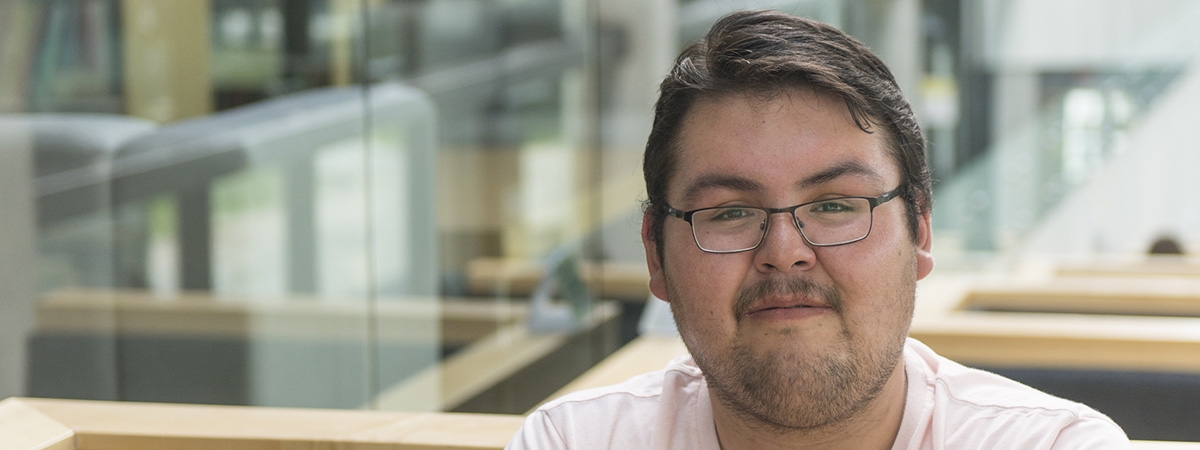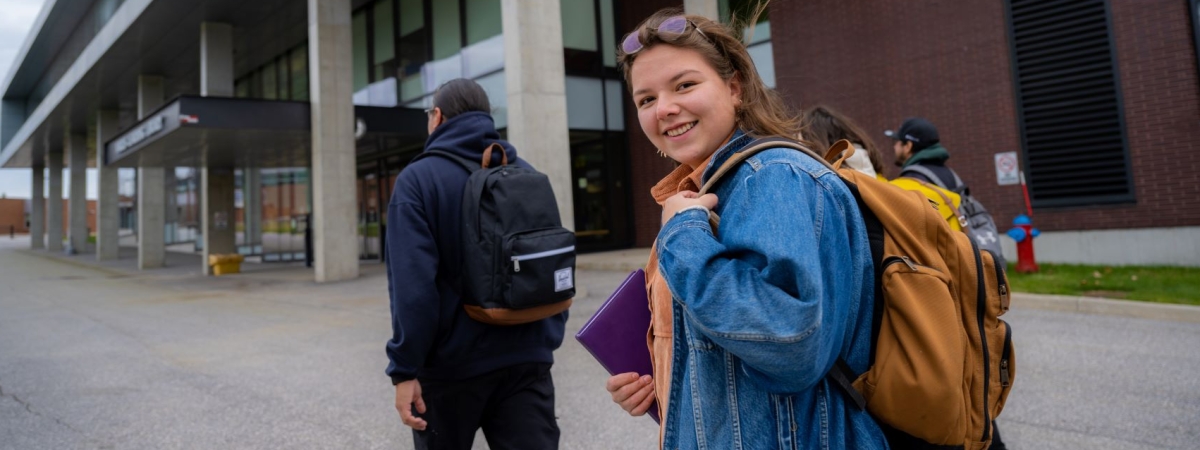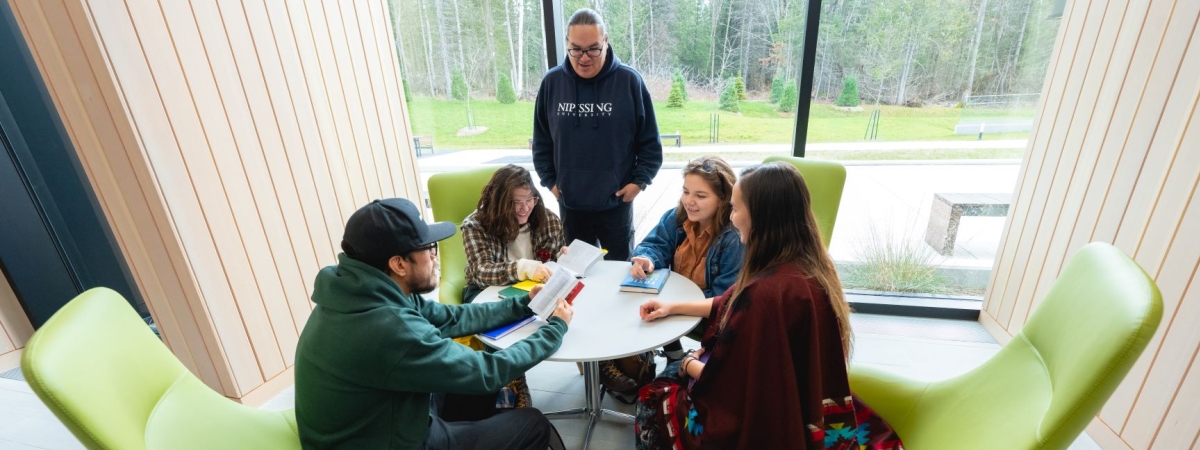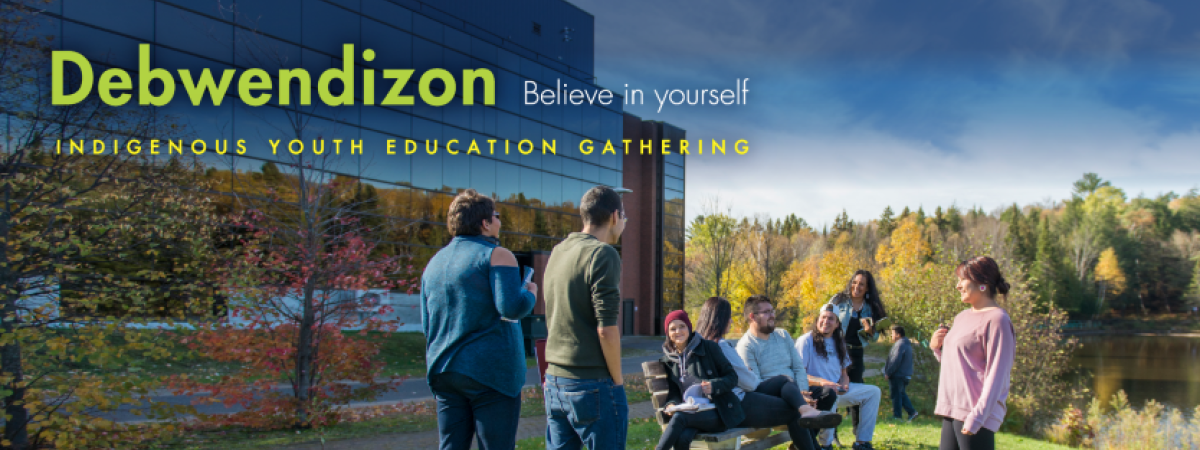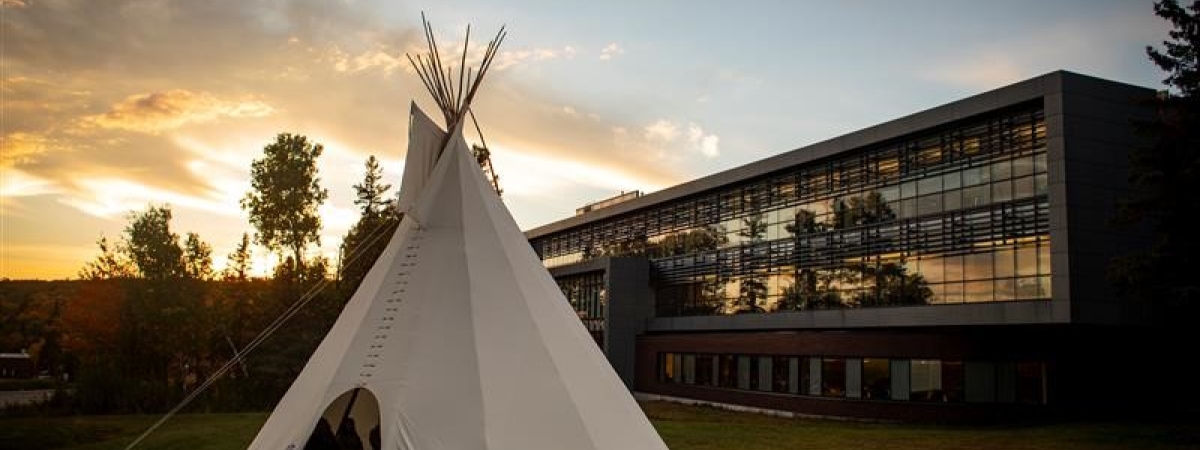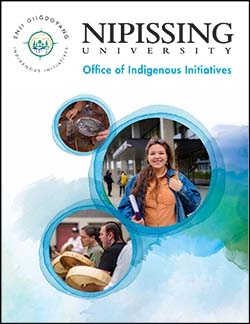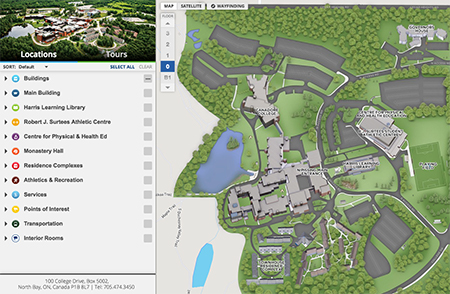Ahnii, Boozhoo, Wachay, Sago, Taansi!
The Office of Indigenous Initiatives welcomes all new and returning students to join us for on-campus or online for a variety of social, cultural and wellness events and activities throughout the academic year. We offer ongoing volunteer opportunities, experiential learning, cultural activities, academic workshops, financial support, tutoring, and peer mentorship for Indigenous students as they navigate the university.
To schedule an appointment or connect with our staff please click here, email us at biindgen@nipissingu.ca, contact us by phone at (705) 474-3450 Ext. 4899 or visit us on campus.
To join our Microsoft Teams - Virtual Enji giigdoyang Student Lounge please sign into office.com with your student credentials and choose Microsoft Teams, then add yourself to our INDIG - Virtual Enji giigdoyang Student Lounge team using this code gwg1s5s.
- Current Students
- Community
- Children & Youth
- Future Students
- Faculty
- News & Events
- Contacts & Requests
Nipissing University is located in the traditional lands of Nipissing First Nation, an Anishnaabek community along the shores of Lake Nipissing, with several First Nations located within a 100 km radius.
We welcome Indigenous students, their families, and communities within inclusive programs in Enji giigdoyang, the Office of Indigenous Initiatives.
In the Nbisiing dialect of Anishinaabemowin, Enji giigdoyang means "where we come to meet, discuss and talk about things," which is the culture we hope to foster. We enhance the educational experience through a holistic approach to student success and wellness. We provide a variety of academic, personal, and cultural supports rooted in Indigenous culture and worldview. We honour one another's life experiences and invite you to connect with our campus community and guests of the university during workshops and events on campus.
Indigenous Student Success
Enji giigdoyang, the Office of Indigenous Initiatives continues to support Indigenous Student Success through academic, personal, and cultural programs offered in-person in our Enji giigdoyang Student Lounge (F215). Students are welcome to drop in to meet with a Student Success Coordinator, or scheduling appointment . We offer ongoing volunteer opportunities, experiential learning, cultural activities, academic workshops, financial support, tutoring, peer mentorship and dedicated Student Success Coordinators who support Indigenous students as they navigate the university.
- To register with the Office of Indigenous Initiatives please click here.;
- To schedule an appointment, ask a question or get involved please click here.
To join our MS Teams Enji giigdoyang Virtual Student Lounge please sign into office.com with your student credentials and choose MS Teams then add yourself to our INDIG - Virtual Enji giigdoyang Student Lounge team using this code gwg1s5s or email us at biindgen@nipissingu.ca and ask to be added.
Nipissing University is located in the traditional lands of Nipissing First Nation, an Anishnaabek community along the shores of Lake Nipissing, with several First Nations located within a 100 km radius. James Bay Cree, Algonquin and Métis peoples also live, go to school and work in North Bay. The University has built respectful and reciprocal relationships with Indigenous communities regionally through the Nipissing University Indigenous Council on Education (NUICE) which includes representation from regional First Nations, as well as Metis and urban Indigenous service organizations. They meet two or more times per year to provide guidance and advice to Nipissing University and have representation on the Nipissing University Board of Governors and Academic Senate. A representative of Nipissing First Nation is a member of the Board of Governors.
Enji giigdoyang, the Office of Indigenous Initiatives, is committed to supporting students and community on and off campus.
Nipissing University Academic Programs
Our Schulich School of Education has offered its Indigenous Education Programs for over thirty-five years, with well over 700 graduates across Ontario. The Indigenous Teacher Education Program, Teacher of Indigenous Languages as a Second Language, and Indigenous Classroom Assistant Diploma programs allow students to return to their home communities for placement while they complete their studies. The Schulich School of Education is currently partnering with Bimose Tribal Council and Oshki-Pimace-O-Win: The Wenjack Education Institute for community-based delivery of the programs.
Our Faculty of Arts and Science offers a Bachelor of Arts in Indigenous Studies with an Indigenous focus and supports transition to university for Indigenous students through the Indigenous Foundations Program and the Summer Indigenous Institute. Innovative aspects of the Indigenous Foundations Program and the Summer Indigenous Institute include the ample holistic support provided by the Office of Indigenous Initiatives, a peer model, and experiential learning opportunities through Indigenous pedagogies and land-based learning.
Biidaaban Community Service-Learning (BCSL)
Your non-profit organization supports local community? Interested in working on projects with students from Nipissing University? Learn more.
Biidaaban Academic Support
Tutoring program for Indigenous youth in grades 1 to 12.
Biidaaban Youth Group
After school cultural activities program for Indigenous youth grades 3, 4, 5 and 6.
Wiidoooktaadwin Indigenous Mentorship Programs
A mentorship program for Indigenous youth in six local secondary schools.
Indigenous Student Success
Academic, personal, and cultural programs and services including application support, volunteer opportunities, experiential learning opportunities, cultural activities, academic workshops, financial support, and peer tutoring,
Research with Indigenous Peoples and Communities
In support of a commitment made by Nipissing University in 2010, faculty, students and staff researchers may request support from the Office of Indigenous Initiatives when their research involves Indigenous peoples and communities. The Office of Indigenous Initiatives may provide support, assistance and advice, where appropriate. The Office of Indigenous Initiatives administers a Community Engagement Plan that is submitted by researchers prior to the submission of their research ethics protocol.
Partnerships
Nipissing University partners with First Nations, tribal councils, urban Indigenous service organizations, and community organizations locally and regionally on events, workshops, and initiatives.
The Office of Indigenous Initiatives offers a number of experiences for Indigenous children and youth, on campus and in community, including mentorship programs, tutoring programs and youth gatherings.
Biidaaban Academic Support
Tutoring program for Indigenous youth in grades 1 to 12.
Biidaaban Youth Group
After school cultural activities program for Indigenous youth grades 3, 4, 5 and 6.
Debwendizon Indigenous Youth Education Gathering
Indigenous youth from northern secondary schools visit campus to learn about university life from students, faculty and staff.
Wiidooktaadwin Indigenous Mentorship Initiative (WIMI)
A mentorship program led by university students for Indigenous youth in secondary schools.
Nipissing University is located in the traditional lands of Nipissing First Nation, an Anishnaabek community along the shores of Lake Nipissing, with several First Nations located within a 100 km radius.
We welcome Indigenous students, their families, Elders, youth and children within inclusive programs in Enji giigdoyang, the Office of Indigenous Initiatives.
In the Nbisiing dialect of Anishnaabemwin, Enji giigdoyang means "where we come to meet, discuss and talk about things," which is the culture we hope to foster. We enhance the educational experience through a holistic approach to academic, personal, and cultural support. We honour one another's life experiences and invite you to connect with our campus community and guests of the university in workshops and events on campus.
Academic Programs
Our Schulich School of Education has offered its Indigenous Education Programs for over thirty-five years, with well over 700 graduates across Ontario. The Indigenous Teacher Education Program, Teacher of Indigenous Languages as a Second Language, and Indigenous Classroom Assistant Diploma programs allow students to return to their home communities for placement while they complete their studies. The Schulich School of Education is currently partnering with Bimose Tribal Council and Oshki-Pimace-O-Win: The Wenjack Education Institute for community-based delivery of the programs.
Our Faculty of Arts and Science offers a Bachelor of Arts in Indigenous Studies with an Anishnaabe focus and supports transition to university for Indigenous students through the Indigenous Foundations Program and the Summer Indigenous Institute. Innovative aspects of the Indigenous Foundations Program and the Summer Indigenous Institute include the ample holistic support provided by the Office of Indigenous Initiatives, a peer model, and experiential learning opportunities through Indigenous pedagogies and land-based learning.
Admissions for Indigenous Students
Nipissing University offers academic programs for Indigenous students with specific application processes as well as pathways to admission. Please click on the link above for more information.
Debwendizon Indigenous Youth Education Gathering
Indigenous youth from northern secondary schools visit campus to learn about university life from students, faculty and staff. We hope that you will join us!
Indigenous Student Success
Academic, personal, and cultural programs and services including application support, volunteer opportunities, experiential learning opportunities, cultural activities, academic workshops, financial support, and peer tutoring,
Nipissing University is located in the traditional lands of Nipissing First Nation, an Anishnaabek community along the shores of Lake Nipissing, with several First Nations located within a 100 km radius.
Please consider the following resources as you plan for teaching and research annually.
Biidaaban Community Service-Learning
Learn more about the supports available for faculty who incorporate community service-learning in their course.
Territorial Acknowledgement
The Nipissing University Indigenous Council on Education (NUICE), Academic Senate and Board of Governors have passed a land acknowledgment. Please consider adding the acknowledgement to course syllabi or your email signature.
As we begin this [insert event], I would like to acknowledge that we are in the territory of the Robinson-Huron Treaty of 1850 and that the land on which we gather is the Nipissing First Nation Traditional Territory and the traditional territory of the Anishnabek. We respect and are grateful to hold this event on these lands with all our relations
Faculty Profiles
Coming soon!
Research with Indigenous Peoples and Communities
In support of a commitment made by Nipissing University in 2010, faculty, students and staff researchers may request support from the Office of Indigenous Initiatives when their research involves Indigenous peoples and communities. The Office of Indigenous Initiatives may provide support, assistance and advice, where appropriate. The Office of Indigenous Initiatives administers a Community Engagement Plan that is submitted by researchers prior to the submission of their research ethics protocol.
Resources for Faculty
These resources have been gathered by our staff. Please feel free to access and share with your colleagues.
Space Booking
Please contact us at oii.bookings@nipissingu.ca to book the Treaty Learning Centre or Tipi(s).
Smudge Requests
Nipissing University supports the practice of smudging for different purposes on campus, including but not limited to cultural events, for community engagement, or engaging with Indigenous pedagogies in the classroom.
If you are planning to conduct a smudge in your classroom or at an event you are hosting, please contact the Secretary to the Director, Indigenous Initiatives to request to have a smudge on campus at least 72 hours in advance and provide the following information:
- Name
- Date
- Time
- Room Number
705.474.3450 ext. 4899 or via email at biindgen@nipissingu.ca
For more information about Nipissing University's smudging policy please see the "Contact Us" tab.
Events
Enji giigoyang, the Office of Indigenous Initiatives, organizes Indigenous Week and the Enji giigdoyang Speaker Series annually with talks, workshops, and film screenings by Indigenous knowledge holders, professionals, writers, scholars, artists, and filmmakers. We also partner with academic departments on campus and organizations in the community to co-present some events each year. Please check the Nipissing University Events Calendar or look for posters on campus and in the Enji giigdoyang student lounge for upcoming events. Everyone is welcome to attend!
Past Events
Between 2013 and 2020, Nipissing University and the Office of Indigenous Initiatives welcomed distinguished scholars, professionals, artists, and community leaders to speak on campus in partnership with multiple community organizations. Due to Covid-19, various events were held virtually between 2020-2021. Highlights include:
- 2021 - Medicine Wheel Teaching with Jennifer Wabano, Nbisiing Knowledge Holder
- 2021 - Indigenous Peoples Day Event with Knowledge Holder Leona Stevens
- 2020 - Orange Shirt Day, an Annual Day of Remembrance of Residential Schools
- 2019 - Interactive Reading of the novel, Moon of the Crusted Snow, with author Waubgeshig Rice, Wasauksing First Nation. Keynote for the Undergraduate Research Conference
- 2019 - Wampum Teaching with Brenda Lee, Indigenous Knowledge Holder
- 2019 - "National Day of Remembrance and Action on Violence Against Women" with Elder Carol Guppy and the Sexual Violence Prevention Outreach Team.
- 2016 - “Reflections on the Royal Commission on Aboriginal Peoples, 20 Years Later” with Dr. Marlene Brant-Castellano, Co-Director of Research, RCAP, Dr. Frederic Wein, Deputy Director of Research, RCAP, and with Dr. Mike DeGagné, President and Vice-Chancellor, Nipissing University
- 2016 - “Unraveling Community in Indigenous-University Research Collaborations” by Indigenous Scholar-in-Residence, Dr. Shauneen Pete, Executive Lead of Indigenization and Faculty of Education, University of Regina, as Keynote for Centre for Interdisciplinary Collaboration in the Arts and Science series
- 2016 - “Reading Birdie as the Letter of the Law: Canadian Fictions and Indigenous Truths” with Dr. Tracy Lindberg, author of Canada Reads 2016 Shortlisted novel, Birdie, and Faculty, University of Ottawa, as Keynote for International Women’s Week
- 2016 - “Reconciliation in Ontario” with Maurice Switzer, member of the Ontario Human Rights Commission, and David Zimmer, the Minister of Indigenous Relations and Reconciliation for Ontario
- 2016 - Launch of RBC Treaty Learning Centre at Nipissing University
- 2016 - Launch of Reconciliation North Bay with June Commanda, Elder of Nipissing First Nation, Dr. Mike DeGagné, President and Vice Chancellor of Nipissing University, and Dakota Heon, student at Nipissing University
- 2016 - “Indigenous Education and the Way Forward” with Governor General David Johnston, student speaker Autumn Varley, Dr. Katrina Srigley, and Clint Davis, Chair of the Board of Directors for the Nunatsiavut Group as part of The KaNaTa Conversations
- 2015 - “Up Ghost River and Issues in the Independent Assessment Process” with author Edmund Metatawabin, co-sponsored by the Aboriginal Student Council and the Office of Indigenous Initiatives
- 2015 - “Closing the Gap: A New Era for First Nations in Canada” Lecture by Perry Bellegarde, National Chief, Assembly of First Nations
- 2014 - “Ethical Research Relationships with Indigenous Peoples” co-presented with Dr. Katrina Srigley, Nipissing University and Glenna Beaucage, Nipissing First Nation (regarding the Nipissing Warriors Project)
- 2014 - “Ethics of Research Involving Indigenous Peoples and Communities” with Dr. Marlene Brant-Castellano, Professor Emeritus, Trent University
- 2013 - The KaNaTa Conversations, “Engaging in Change: Reflections and Strategies on First Nations-Canada Relations” in partnership with the Assembly of First Nations and Shawn Atleo, Hereditary Chief of the Ahousaht First Nation and former Nation Chief of the Assembly of First Nation in Canada
Enji giigdoyang Speaker Series
- 2018 - “Anishinabek Child Well-Being Law Implementation” with Adrienne Pelletier
- 2018 - “My Role in the Relationships with Ininiimowin (Cree Language) and Tipaachimowin (Story) ” with Lorraine Sutherland
- 2017 - “She Speaks Alongside the Water: Environmental Panel” with Autumn Peltier, Dr. Carly Dokis, Paige Restoule and Stephanie Peltier with an opening by Carol Guppy for Treaties Recognition Week in Ontario
- 2017 - “The Significance of Treaty Today” with Fred Bellefeuille
- 2017 - “Beyond Canada 150” with Maurice Switzer, Alderville First Nation and member of the Ontario Human Rights Commission
- 2017 - “Curatorial Talk: Inviting Materials” with curator, Lisa Myers
- 2017 - “Freedom Sings: Land/Bodies/Resurgence” with Dr. Leanne Simpson, Michi Saagiig Nishnaabeg scholar, writer and artist of Alderville First Nation
- 2017 - Dibaadan Motivational Guest Speaker Sid Bobb, Co-Artistic Director of Big Medicine Studio
- 2017 - “BLACKBEAR” Warrant Officer Sheldon Quinn, First Nations and the Canadian Armed Forces
- 2016 - “Anishnaabe Mino-Biimaadiziwin: A Traditional Model of Teaching and Learning in the Academy” with Dr. Renee Bedard, Nipissing University
- 2016 - Wampum Teachings with Maurice Switzer, Alderville First Nation and Ken Maracle, distinguished Indigenous knowledge holder
- 2016 - “Two-eyed Seeing, Wise Practices in Indigenous Health Research and Application for Indigenization” with Dr. Cindy Peltier, Nipissing University
- 2014 - “Time for Reflection” with Sid Bobb, Co-Artistic Director of Big Medicine Studio
- 2014 - “Walking the Path” with George Couchie, retired officer of the Ontario Provincial Police and Nipissing First Nation member
- 2014 - “Importance of Indigenous Language” with Muriel Sawyer, Deputy Chief, Nipissing First Nation
- 2014 - “Alive with Breath” a talk with filmmaker, Jules Koostachin
- 2014 - Trick or Treaty film screening with Alanis Obamsawin, master Indigenous documentary filmmaker, at the Capitol Centre. The film was introduced by the late Dr. John Long, author and advisor to the Mushkegowuk, and was followed by a Q & A with the filmmaker.
Indigenous Week Events
- 2021 - Storytelling by Perry McLeod-Shabogesic, Ojibway Anishinabe from N'biising (Nipissing) First Nation
- 2021 - Traditional Teaching with Indigenous Knowledge Holder Leona Stevens and Indigenous Knowledge Holder Wes Whetung
- 2021 - "Birth of a Family" Screening and Q&A with Filmmaker Tasha Hubbard
- 2021 - Virtual Reading and Q&A with Researcher Gina Starblanket and Author Dallas Hunt
- 2019 - Traditional Teaching on Smudging by Elder Carol Guppy from Temagami
- 2019 - “The Circle is Strong: Family, Identity, and the Child Welfare System” with Nipissing Alumnus, Autumn Varley, of Kitigan Zibi Anishinabeg First Nation
- 2019 - “Treaty Foundations: The Relevance of the Covenant Chain to the Robinson Huron Treaty” with Alan Ojiig Corbiere, M’Chigeeng First Nation
- 2019 - “Acknowledging the Truth, Reconciling the Past, and Honouring Community Voices” with Dr. Jenny Kay Dupuis of Nipissing First Nation, a talk on her award-winning book I am Not a Number. She was accompanied by language speakers Dr. Muriel Sawyer, Geraldine McLeod, and Tory Fisher of Nipissing First Nation who shared their experiences translating the book from English to Nishnaabemwin
- 2018 - Holistic Support of Indigenous Students, a discussion of the Diibaadan project with Maurice Switzer, Neva Isaac, Cindy Hare and Dakota Heon facilitated by Tanya Lukin-Linklater
- 2018 - “Maggie and Me: A Healing Dance” performed by Christine Friday of Temagami First Nation followed by an artist talk
- 2018 - Traditional Teaching on Medicines with Perry McLeod-Shabogesic, Nipissing First Nation
- 2018 - Colonization Road - Film screening and talk with filmmaker, Michelle St. John.
- 2016 - “They are all Somebody’s Daughter,” a singing workshop and participatory performance with Peter Morin, artist and faculty at OCAD University
- 2016 - "A Red Girl’s Reasoning" and "Bihttos" film screening and talk with Elle-Maija Tailfeathers, award-winning filmmaker
- 2016 - Curatorial talk with Jordan Wilson, award-winning co-curator of the exhibition, ćǝsnaɁǝm, the city before the city
- 2016 - “The Treaty Right to Vote” with Maurice Switzer, member of the Ontario Human Rights Commission
- 2015 - “Building Relationships in Community Through Indigenous Research” with Dawn Lamothe, Urban Aboriginal Strategy Coordinator, and Paige Restoule, graduate student at Nipissing University
- 2015 - “Reveries of a Solitary Indian” with Associate Professor Dale Turner, Dartmouth College
- 2015 - Traditional Teaching on Smudging with elder John Sawyer, Nipping First Nation
- 2015 - Drum Workshop with Gerald McComb, Indigenous artist and Alumnus of Nipissing University
- 2015 - Beading Workshop with Brenda Lee, Indigenous artist
- 2015 - Traditional Singing with Tasheena Sarazin, Indigenous singer
Symposia
- 2019 - Symposium on Indigenous Student Transition with community education panel, Indigenous student panel, a keynote by Dr. Sheila Cote-Meek and presentations by staff and administration working in Indigenous student transition
- 2018 - 6th Annual Canadian Symposium on Indigenous Teacher Education, “Maamwistoong neniizh akiin Bridging Two Worlds: Perspectives of Indigenous and non-Indigenous Pedagogies” with the following keynotes: “Anishinaabek Education System: Planning to Deliver Indigenous Education” with Kelly Crawford, Director of Education, Kinoomaadziwin Education Body, M’Chigeeng First Nation; “Anishnaabemowin Language Teachers’ Reflections on Indigenous and Western Pedagogies” with Candace Fisher (NPSCDSB), Tory Fisher (NPSCDSB), Alysha Allaire (Near North Schools), Falcon McLeod (Near North Schools) and Blair Beaucage (Nbisiing Secondary School, NFN); “Experiences in Indigenization at Canadian Universities” with Dr. Cindy Peltier, Chair of Indigenous Education, Nipissing University, Nipissing First Nation, Wikwemikong Unceded Territory, and Dr. Anna-Leah King, Chair of Indigenization, University of Regina, Wikwemikong Unceded Territory
- 2014 - Symposium on Indigenous Student Transition with a keynote by Dr. Marie Battiste, and panels with staff, faculty and elders working to support Indigenous student transition
- 2014 - Maadhookiwin - Sharing Symposium regarding the Treaty Learning Centre in partnership with Anishnabek/the Union of Ontario Indians, Nipissing First Nation and Canadore College.
If you need assistance or have any questions please contact one of the Office of Indigenous Initiatives staff listed below:
- Phone: 705-474-3450 ext. 4899
- Fax: 705-472-8601
- Email:
- Prospective students:indigenousprograms@nipissingu.ca
- Summer Indigenous Education Programs:indigenouseducation@nipissingu.ca
- Current students, community members and/or faculty inquiries:biindgen@nipissingu.ca
- Indigenous Transition Programs: indigenousprograms@nipissingu.ca
- Student success programs and services:biindgen@nipissingu.ca
- Space Bookings (Treaty Learning Centre & Tipi(s): oii.bookings@nipissingu.ca

